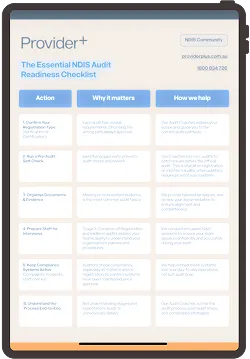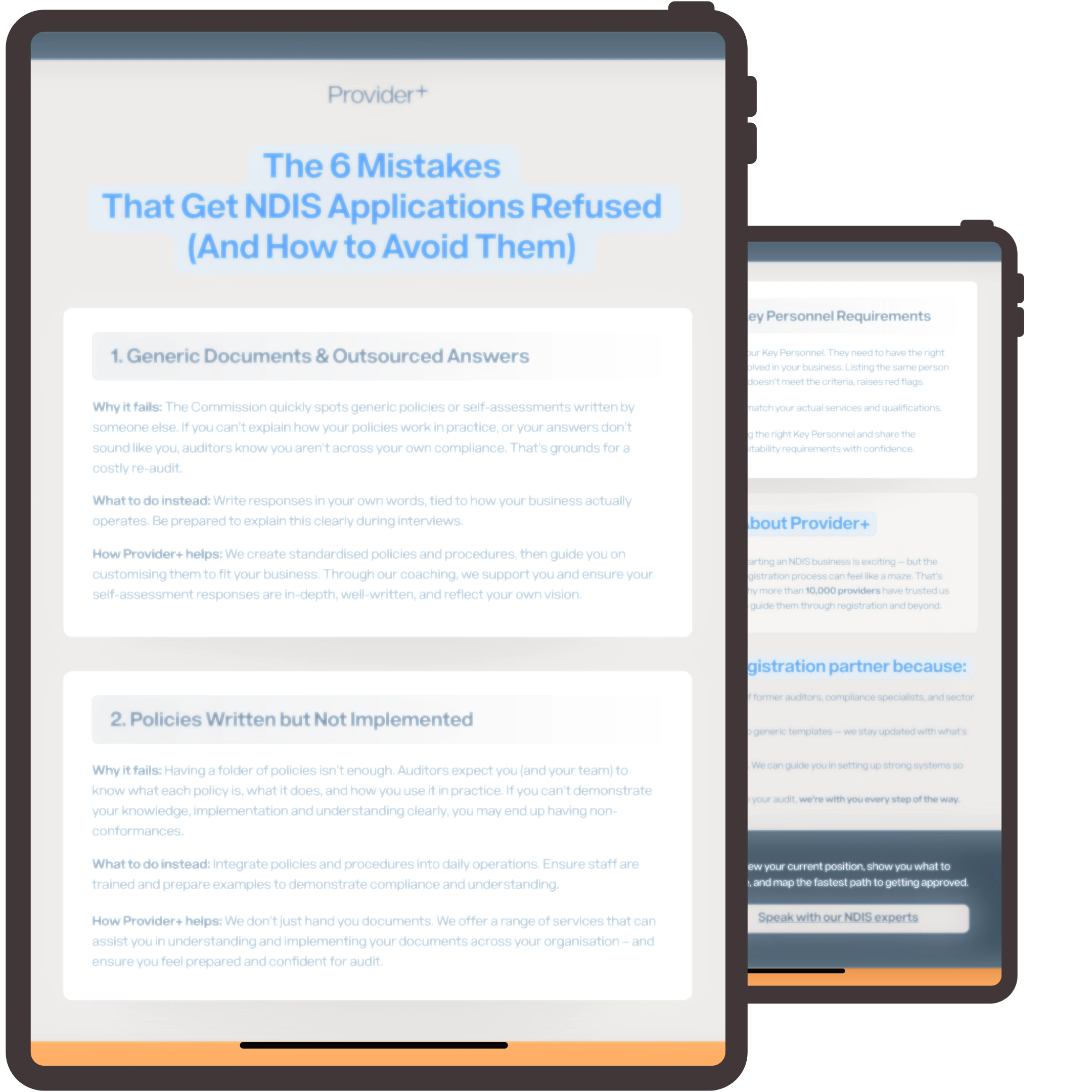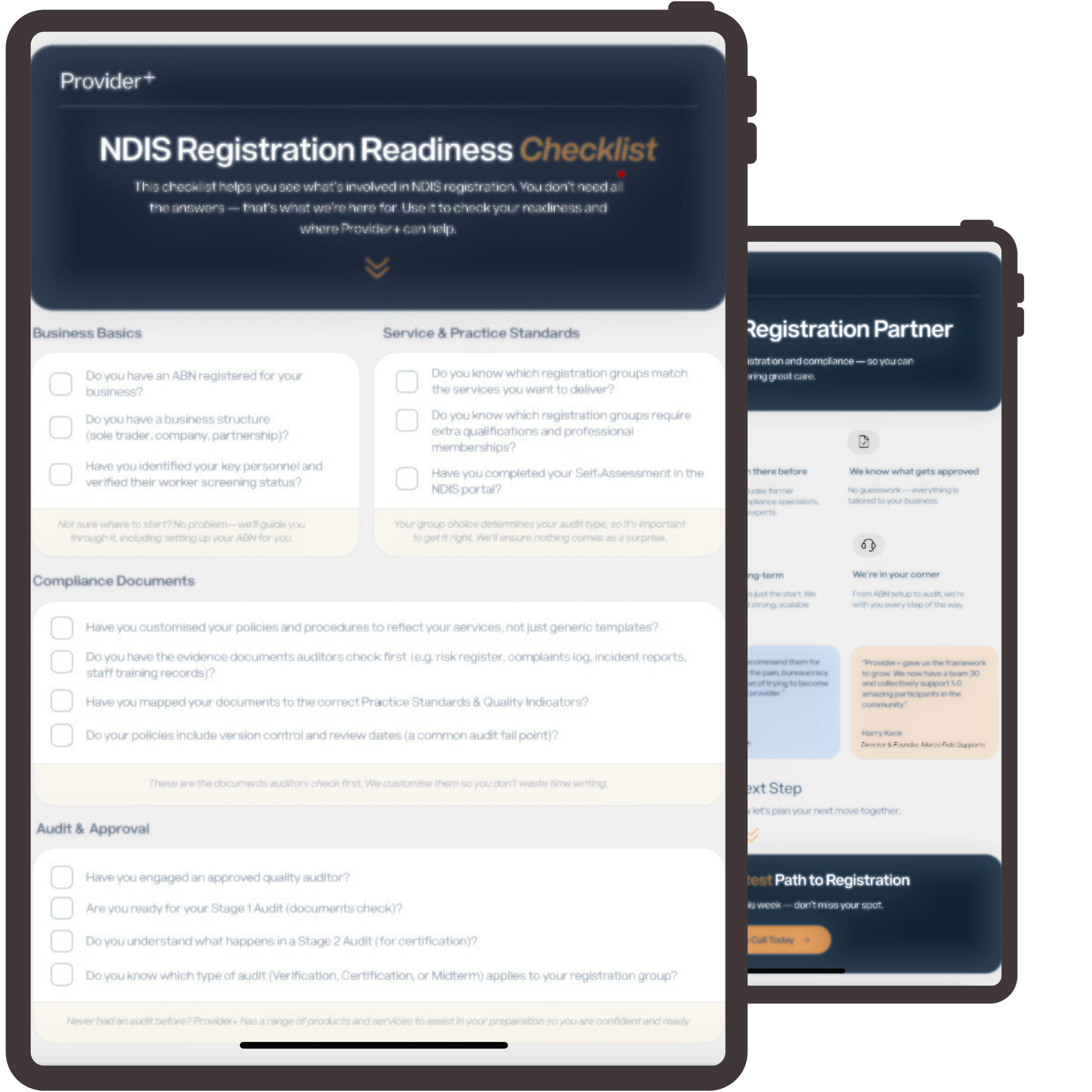The Ultimate Guide for Unregistered NDIS Providers (2025 Update)
Unregistered NDIS providers have long played a vital role in the disability support landscape, offering participants flexibility and choice. However, recent policy changes and proposals are reshaping the rules of engagement. In this updated guide, we break down the latest NDIS policy changes—including new rules that allow participants to be switched from plan-managed or self-managed to agency-managed funding—and explore what these shifts mean for unregistered providers. We’ll examine the potential impacts (like client loss and service restrictions), provide strategic insights into the future of unregistered providers, and outline fact-based, actionable steps you can take to mitigate risks and adapt. Whether you need to make immediate decisions or plan for the long term, this comprehensive guide will equip you with the knowledge and strategies to navigate the changing NDIS environment.
Understanding Unregistered Providers in the NDIS Context
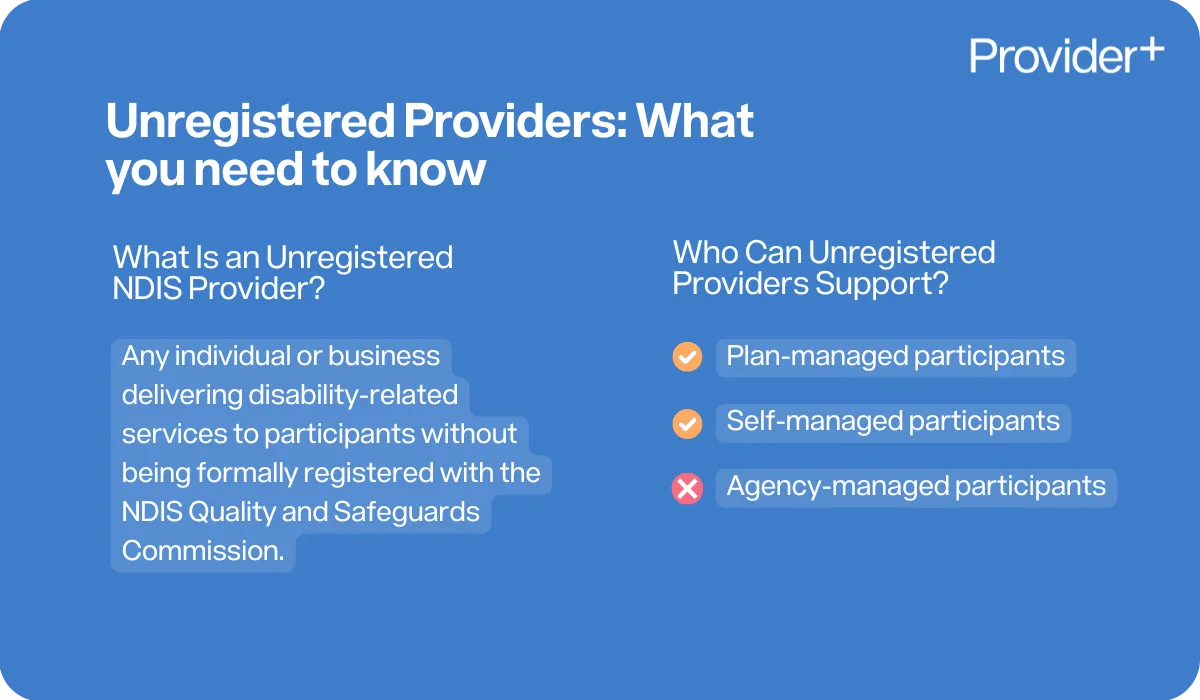
What Is an Unregistered NDIS Provider?
In the NDIS, any business or individual providing disability-related services to participants without formally registering with the NDIS Quality and Safeguards Commission is considered an unregistered provider. Registration is an optional process that involves meeting strict compliance standards and undergoing audits—a step that many small or new providers choose to forego. In essence, operating as an “unregistered” provider is the default status when you simply deliver your services without formal NDIS Commission registration.
The main difference between registered and unregistered NDIS providers lies in their regulatory status and market access and as an unregistered provider understanding thee aspects is crucial for both providers and participants.
Who Can Unregistered Providers Support?
While all NDIS participants can choose from registered providers, only those with self-managed or plan-managed funding are able to pay unregistered providers using NDIS funds. Participants whose plans are agency-managed by the National Disability Insurance Agency (NDIA) are restricted to using registered providers. This distinction is crucial: as an unregistered provider, you rely entirely on clients who have the flexibility of self- or plan management. Currently, this accounts for a large portion of the market, with around 70% or more of participants having the option to use unregistered providers. Participants often choose unregistered providers for their personal touch, cost savings, and bespoke supports.
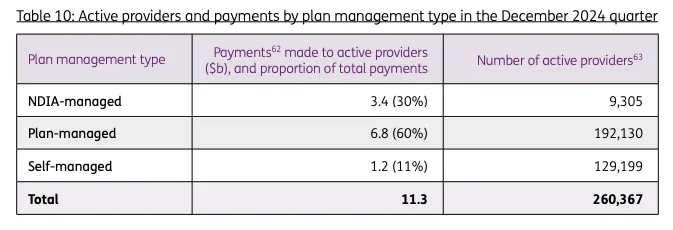
Why Participants Value Unregistered Providers
Many participants deliberately opt for unregistered providers to gain more control and personalised services. In interviews and surveys, participants have noted benefits such as flexible scheduling, the ability to negotiate prices, and the personal connection found in smaller, community-based services. Unregistered providers often fill important gaps by offering bespoke supports that are not always available through larger registered organisations.
Recent NDIS Legislation Changes: Participants Being Switched to Agency-Managed Funding
What Changed?
From late 2024, new legislation and accompanying NDIS rules expanded the NDIA’s power to change a participant’s plan management type. Under these “Management of Funding” rule changes, the NDIA can now switch a participant from self-managed or plan-managed to agency-managed funding if it deems there is a risk that the funds might not be used properly. This is a significant departure from previous practices, where the NDIA almost always honoured a participant’s chosen management style—except in extreme circumstances.
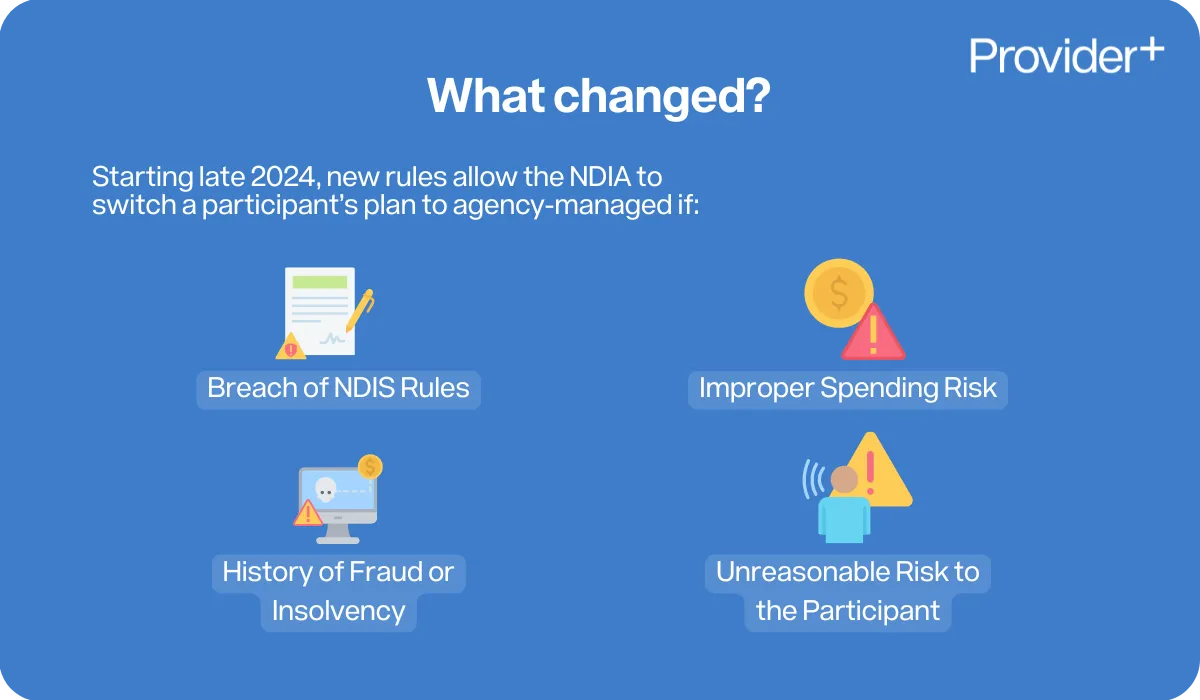
Key Provisions of the Plan Management Decision
- Improper Spending Risk: If there is a belief that NDIS funds are not being used in line with the participant’s plan, the NDIA can intervene.
- Unreasonable Risk to the Participant: If the NDIA deems that the current management poses an “unreasonable risk” to the participant’s wellbeing, it may switch the plan management to agency-managed.
- History of Fraud or Insolvency: Participants or their nominees with a history of fraud, serious financial misconduct, or insolvency may be subject to the NDIA changing the way your plan is managed.
- Breach of NDIS Rules: Any breach of NDIS rules can also trigger this switch.
These measures were introduced to protect both participants and the integrity of NDIS funds. If a participant has misused funds or if there is an indication that the funds might be misapplied in the future, the NDIA has the authority to take control by moving the plan to agency-managed status. Once a plan is agency-managed, participants are restricted to using only registered providers.
Why Is This Happening?
These changes come in response to growing concerns about fraud, exploitation, and misuse of NDIS funds. Government officials and the NDIA have emphasised that the measures are designed to protect vulnerable participants and ensure that funds are spent in a manner that directly supports the participant’s approved goals.
The Implications
For unregistered providers, these changes are significant. Participants need to pay unregistered providers directly and then manually claim the funds back through the NDIS portal. If a participant’s plan is switched to agency-managed funding, you will no longer be able to support that participant as an unregistered provider, as the participant will be required to select a registered provider for future supports. Even if a client values your service, the rules prevent them from continuing with an unregistered provider once their funding type changes.
How This Affects Unregistered Providers: Client Loss, Service Limitations, and Uncertainty
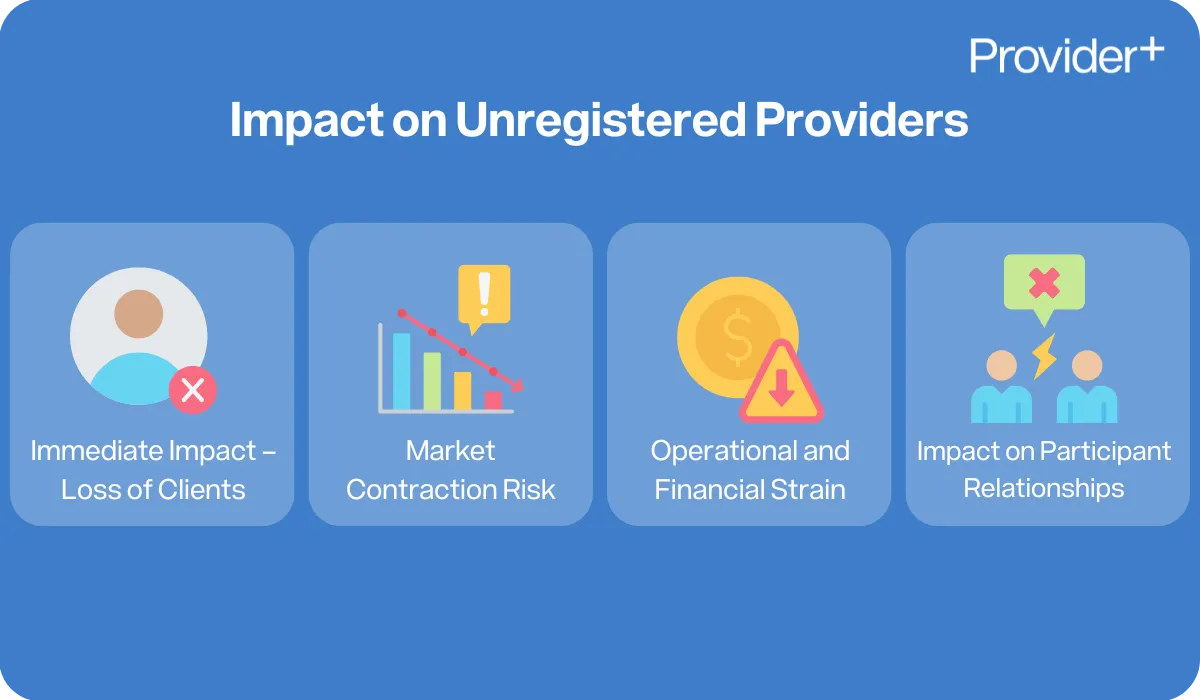
Immediate Impact – Loss of Clients
Unregistered providers may suddenly lose clients if a participant’s plan is moved to agency-managed funding. The NDIA’s ability to switch funding management means that a client who previously could choose an unregistered provider is now mandated to use only registered providers. For providers who rely on just a few NDIS clients, this can lead to an abrupt drop in income.
Market Contraction Risk
If the NDIA applies these measures broadly, the number of participants able to access unregistered providers will shrink. This reduction in the client pool may lead to a slower rate of new client referrals, especially if plan managers and support coordinators begin favouring registered providers to mitigate compliance risks. The differences between registered and unregistered NDIS providers are crucial, as registered providers undergo rigorous assessments and have broader market access, while unregistered providers face fewer regulatory requirements and are limited in the scope of participants they can serve.
Operational and Financial Strain
The unpredictability of client loss makes it difficult to plan and forecast revenue. It may also necessitate investing in tighter internal controls and compliance measures—costs that can further strain small businesses. In a more regulated environment, even unregistered providers might need to adopt practices similar to those required for full registration.
Impact on Participant Relationships
Unregistered providers often build strong, trust-based relationships with their clients. A forced switch to agency-managed funding not only severs these business relationships but may also cause distress for participants who value the personalised support they receive. However, it is important to understand the pros and cons of registered and unregistered providers in this context. Registered providers must meet strict regulatory requirements, offering greater security and market access, while unregistered providers offer more flexibility but with a limited scope.
Case Example
Consider an unregistered support coordinator who has been working with a self-managed participant for years. If a plan review triggers a switch to agency-managed funding, the participant must now select a registered support coordinator—even if they have been extremely satisfied with the current service. The result is an immediate and unwelcome disruption for both parties.
The Future of Unregistered Providers: Strategic Insights and Emerging Trends
A Push Toward Mandatory Provider Registration or Enrolment
The recent NDIS Review (2023) has signalled that the days of operating entirely unregistered may be numbered. The Review’s recommendations suggest that, over the next few years, the NDIS may require all providers to either register or enrol in a tiered system. In a graduated model, lower-risk providers might have a “light-touch” enrolment process, while higher-risk services would require full registration and audits. The message is clear: increased oversight is coming.
Understanding the steps and importance of NDIS provider registering is crucial for credibility and meeting the demand for quality personal care services. Compliance with the NDIS Quality and Safeguards Commission and utilising tools that streamline administrative tasks can significantly enhance service delivery.
Targeted Mandatory Registration in High-Risk Categories
Even before a system-wide mandate, certain provider types—such as Support Coordinators, Supported Independent Living (SIL) providers, and online platform providers—are already slated for mandatory registration. For providers in these categories, registration is imminent, and waiting too long may result in being forced out of the market.
Enhanced Scrutiny Even for Unregistered Providers
New data analytics and stronger monitoring by the NDIA mean that even unregistered providers are under greater scrutiny. Plan managers and support coordinators are being reminded to ensure that all claims are compliant with NDIS guidelines. This increased oversight demands that all providers—registered or not—operate with the highest standards of transparency and accountability. However, NDIS registered providers benefit from being able to offer a wider range of supports and services, meeting specific criteria set by the NDIS Quality and Safeguards Commission.
Participant Sentiment and Advocacy
Despite tightening regulations, many participants continue to value the choice and personalised service provided by unregistered providers. Surveys indicate that a significant number of participants oppose a blanket move to registered-only providers, underscoring the importance of maintaining flexibility and choice and control in the NDIS marketplace. There is an ongoing debate about balancing robust safeguards with the freedom of choice that unregistered providers offer.
Business Model Adaptations
Forward-thinking unregistered providers are already exploring ways to diversify their business models. Options include forming partnerships with registered providers, branching into private-pay or alternative funding streams, and investing in quality management systems that could ease the transition to registration should it become mandatory. Unregistered providers who position themselves as high-quality, “registration-ready” businesses are likely to be better placed in a future regulatory environment.
Actionable Steps for Unregistered Providers: Mitigating Risks and Adapting to New Regulations
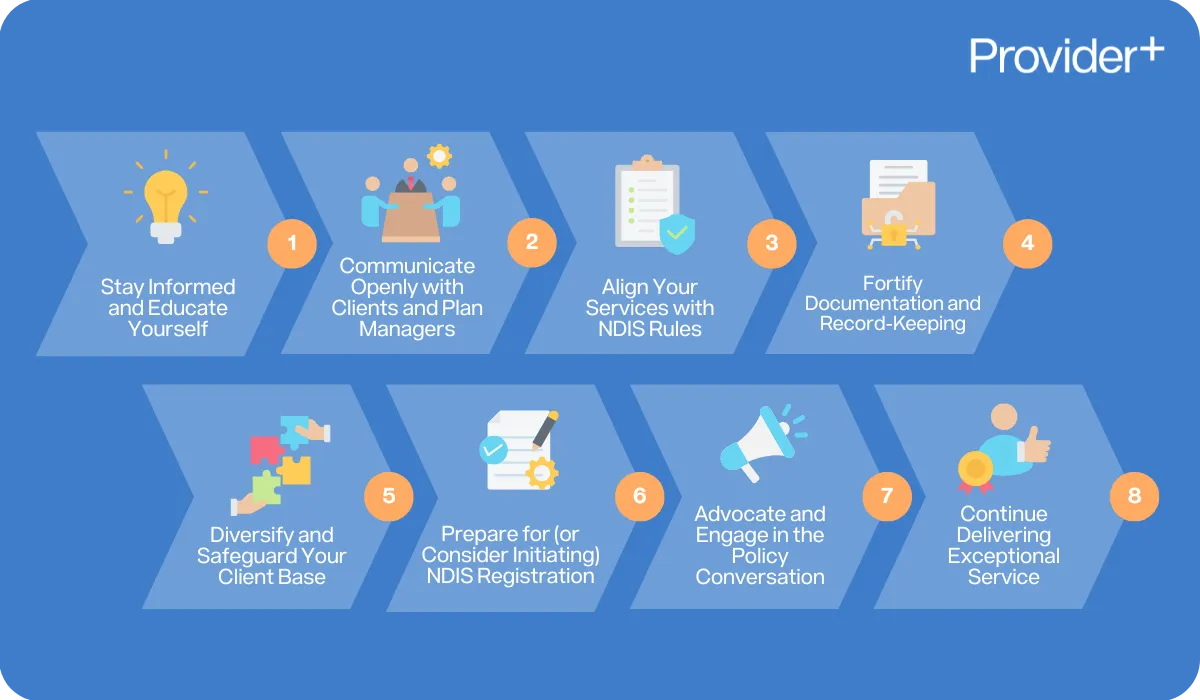
1. Stay Informed and Educate Yourself
- Subscribe to Updates: Regularly check official NDIA and NDIS Commission channels as well as trusted industry sources for policy updates.
- Engage in Forums: Join provider forums or networks to stay ahead of emerging issues and share experiences with peers.
- Review Rules and Guidelines: Ensure you fully understand key documents like the NDIS Practice Standards and the new “Management of Funding” rules. Familiarise yourself with the NDIS price guide to ensure compliance with pricing arrangements.
2. Communicate Openly with Clients and Plan Managers
- Explain the Changes: Inform your clients and their plan managers about the new rules in clear, non-alarmist language.
- Discuss Contingency Plans: Develop and share plans on how to proceed if a funding management change occurs.
- Build Trust: Reinforce your commitment to compliance and quality service, which may help participants advocate on your behalf. Engage with local disability support networks to build trust and credibility within the community.
3. Align Your Services with NDIS Rules
- Review Client Plans: Regularly verify that your services are directly tied to each client’s funded supports and goals.
- Adhere to Pricing Limits: Ensure that all invoiced services conform to the NDIS Pricing Arrangements and Price Limits.
- Avoid Grey-Area Claims: Steer clear of billing for supports that fall outside approved categories to prevent triggering agency-managed switches.
4. Fortify Documentation and Record-Keeping
- Maintain Service Agreements: Use formal, signed agreements that detail the supports provided and reference the participant’s NDIS plan.
- Keep Detailed Records: Log session notes, outcomes, and detailed invoices that clearly connect to the participant’s goals.
- Build an Audit Trail: Save all communications, invoices, and approval emails to create a robust record in case of NDIA review.
5. Diversify and Safeguard Your Client Base
- Expand Your Market: Consider diversifying your client mix by exploring additional service categories or alternative funding sources.
- Balance Management Types: Aim to have a mix of self-managed and plan-managed clients to reduce dependency on one funding model.
- Prepare for Loss: Develop strategies for quick transitions should a client be moved to agency-managed funding, such as forming partnerships with registered providers or establishing contingency plans for private-pay options.
6. Prepare for (or Consider Initiating) NDIS Registration
- Conduct a Gap Analysis: Evaluate your current processes against the NDIS Practice Standards to identify areas that need strengthening.
- Build “Registration-Ready” Systems: Invest in quality management, staff training, and documentation improvements that align with registered provider requirements.
- Seek Professional Advice: Consult with peers, mentors, or specialist advisors who have experience transitioning from unregistered to registered status. Additionally, understand the registration process and the differences between a registered NDIS provider and an unregistered provider to make informed decisions.
7. Advocate and Engage in the Policy Conversation
- Provide Feedback: When consultations or surveys are available, contribute your perspective on how changes might impact your service delivery.
- Join Networks: Engage with provider associations and advocacy groups to ensure that the voices of unregistered providers are heard.
- Stay Active on Social Media: Platforms like provider forums or social media groups can offer timely insights and support as the regulatory environment evolves.
8. Continue Delivering Exceptional Service
- Focus on Quality: Maintain high service standards that clearly demonstrate the positive outcomes you deliver for participants.
- Document Success Stories: Collect testimonials and outcome data that reinforce the value of your support.
- Upskill Regularly: Invest in ongoing professional development to ensure that your skills and methods remain competitive and compliant.
Conclusion
The NDIS environment for unregistered providers is changing rapidly. With the NDIA now empowered to switch participants from self-managed or plan-managed to agency-managed funding, the stakes for unregistered providers have never been higher. This shift can lead to an immediate loss of clients, reduced market opportunities, and increased operational pressures.
However, these challenges also present an opportunity: by adapting proactively, unregistered providers can not only mitigate risks but also position themselves for long-term success. Whether by refining compliance processes, enhancing communication with clients, diversifying services, or even transitioning into registration, the key is to stay informed, remain adaptable, and always prioritise quality service.
Use this guide as a resource to review your practices regularly, implement the actionable steps provided, and engage with industry developments. The ultimate goal is to ensure that you continue to deliver the high-quality support that participants need while protecting your business in a rapidly evolving regulatory landscape.
Remember, change is inevitable—but with careful planning and strategic action, you can turn these challenges into opportunities for growth and enhanced service delivery.
